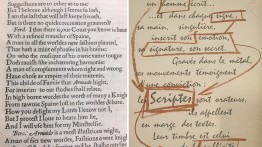Is It Type? 500 Years of “Fooling” the Reader
Monday, November 13, 2023, 12:30 - 2:30pm

Printers sometimes want to make things that look handwritten. The earliest printers sought to reproduce handwriting with metal type and woodblocks; and over the centuries, engraving, lithography, photography, and digital design made it even easier to reproduce even the most delicate and intricate handwriting in print. Yet simultaneously, from the dawn of printing, scribes and calligraphers attempted to create manuscripts that look as though they are printed. As part of the Herb Lubalin Lecture Series, Jill Gage will discuss the history of how – and why – letterform technologies have tried to fool the eye.
Register here for the online event.
Since 2016, Jill Gage has been the Custodian of the John M. Wing Foundation on the History of Printing at the Newberry Library in Chicago. She has curated a number of exhibitions at the library, most recently, A Show of Hands: Handwriting in the Age of Print (2022). She is currently working two forthcoming exhibitions, one on immigrant printing in Chicago (2024) and another on pre-Gutenberg printing (2027). She holds an M.S. in Library and Information Science from the University of Illinois and a PhD in English from the University of London.




